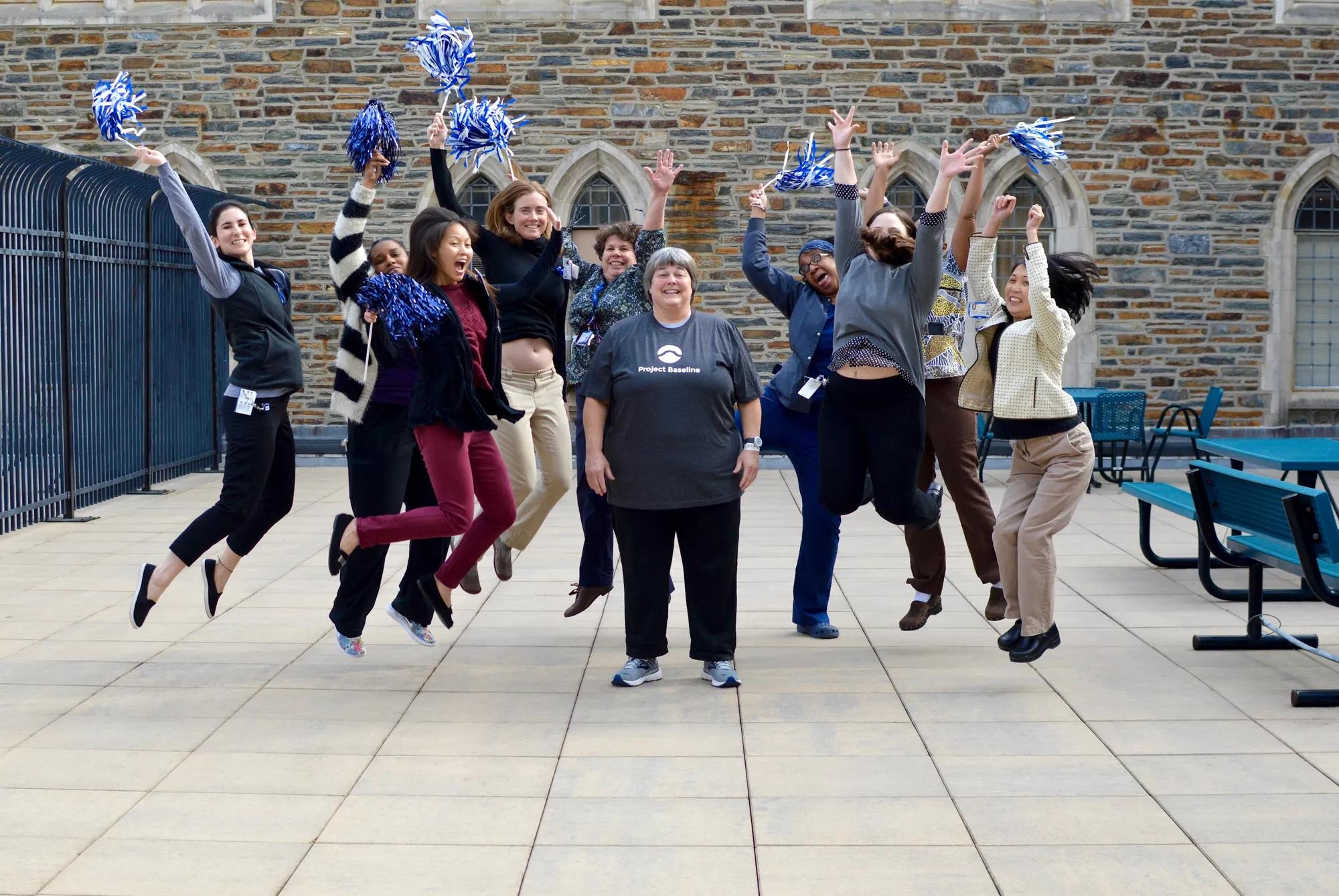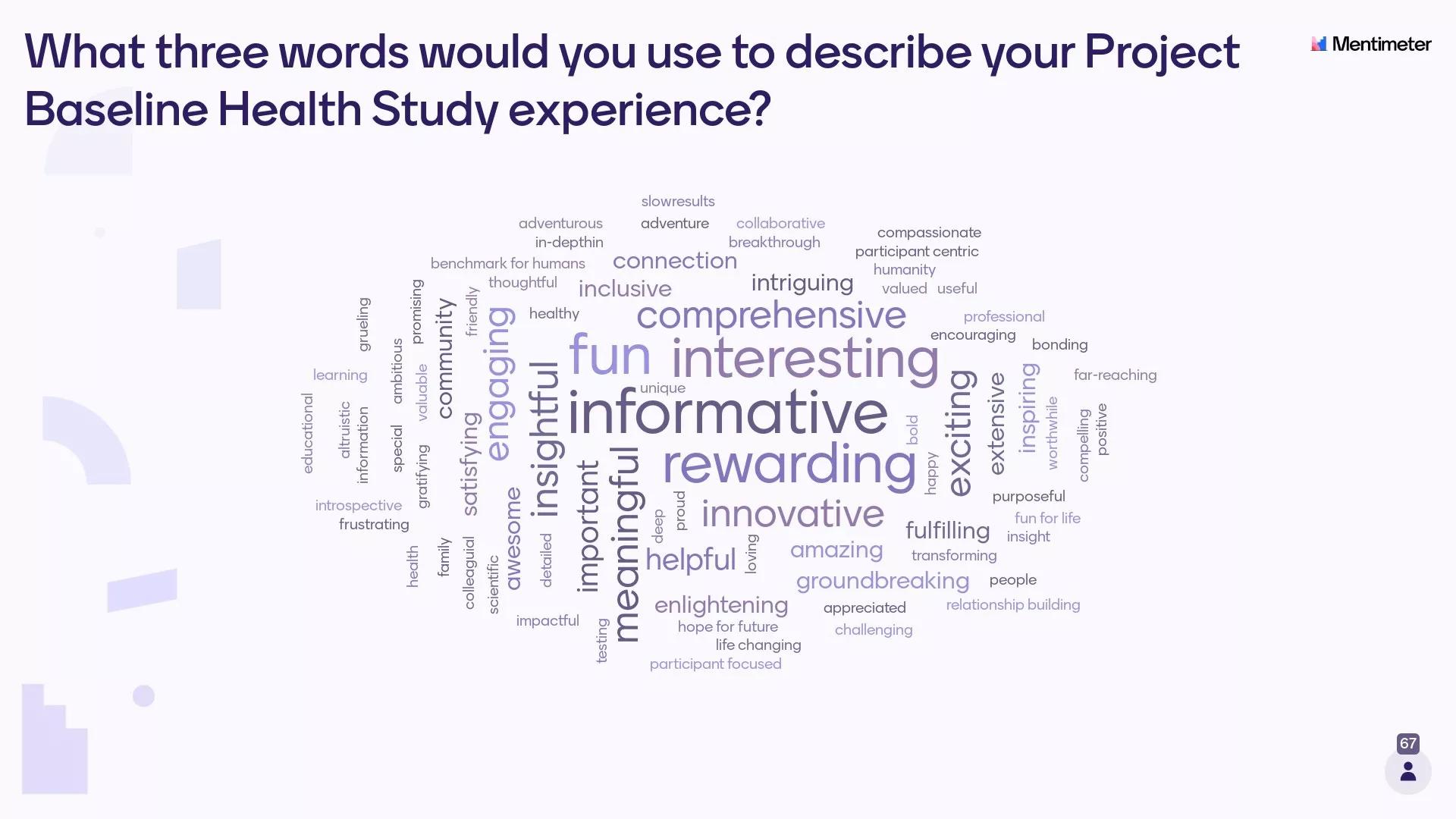Celebrating Together: Baseline Health Study’s Four-Year Anniversary Event


In May 2022, Project Baseline Health Study (BHS) participants and researchers from the California Health and Longevity Institute, Stanford Medicine, and Duke University School of Medicine came together to celebrate the Four-Year Anniversary Celebration. Hosted by Principal Investigator (PI) for the Project Baseline Health Study, Shannon Sullivan, MD, and Engagement Committee Lead, Brian Goings-Reid, MPH, the event allowed the community to connect and celebrate the accomplishments of BHS so far. Speakers included Jess Mega, Verily Chief Medical & Science Officer, Co-Founder; and Core Study Lead and PIs Adrian Hernandez, MD, Executive Director of the DCRI; Svati Shah, MD, Duke PI; and Kenneth Mahaffey, MD, Stanford PI.
The event included presentations from researchers from our four study sites, interactive polls on participant experiences, and a video of participants sharing their experiences through BHS.
“A CELEBRATION OF PROJECT BASELINE HEALTH STUDY: PARTICIPANT VOICES AND PHOTOS”
Our participants emphasized how important it was to feel taken care of by the research site teams and seeing the friendly, familiar faces of those they recognized at each visit. Paired with this sense of belonging was an enduring motivation that their contributions to BHS represented something much bigger than themselves – that they were part of making a difference in the health of future generations.
Participants also revealed another crucial aspect of clinical research: the opportunity to discover new insights about their health, including undiagnosed health conditions. For many, this allowed them to address health concerns that could have otherwise gone untreated. This speaks directly to a belief we have as part of Verily: that empowering people with information about their health allows them to seek proactive, personalized care solutions.
SHOW ME THE DATA!
During the event, many participants expressed a curiosity for the real-world implications of how their contributions are affecting health research and the future of the study. In the world of clinical research, publications of study findings represent more than just a collection of data – they are proof points from the scientific community that we are moving in the right direction with the work we’re doing, that we have tangible, practical results that could advance our understanding of human health.
Accelerated Aging
Through the study of blood samples, health assessments, and imaging, researchers aimed to identify abnormalities associated with accelerated aging. The abstract of our research, featured in the American Heart Association’s Circulation journal, found that certain characteristics associated with accelerated aging included being male, heaving heart, blood and kidney abnormalities, and lower vitamin D levels. The results allow future researchers to focus on specific health characteristics and how to prevent the adverse effects of aging.
Generalized Anxiety Disorder (GAD) and Depression
Practitioners diagnosing mental health conditions like anxiety and depression often utilize standardized tools such as the Generalized Anxiety Disorder-7 (GAD-7) and the Patient Health Questionnaire-9 (PHQ-9). But they can be inadequate pictures of the lived experiences of these patients. This led Project Baseline researchers to focus studies on anxiety and depression by comparing questionnaire scores with various health assessments (biological and physical) as well as demographic and socioeconomic questions.
The two depression publications on social determinants and additional health factors found that higher scores for depression were associated with characteristics such as being female, a younger age, Hispanic, and of low socioeconomic status (i.e. employment, income, education, etc.).
More research is needed to better understand the relationships between race/ethnicity, age, socioeconomic factors, medical conditions, physical activity, and family dynamics and their associations with anxiety. But the health implications of this research highlight that care providers should consider both their patients’ symptoms and social determinants of health when it comes to the diagnosis and care of anxiety and depression.
We’re proud to share that through the efforts of the BHS community, we have 19 total research publications, spanning across general health, mental health, heart health, and COVID-19. And with several ongoing research studies in these areas, we’re even more hopeful for what the future holds. Other than these findings we highlighted, BHS members can find the latest study-related publications in the “Discover” section of the Baseline App.
LOOKING TOWARD THE FUTURE OF HUMAN HEALTH

Though comprehensive tests will continue until our participants’ 4th annual visit, our researchers will conduct long-term follow-up on them to assess the longitudinal impact on health and disease in relation to aging. Participants can continue contributing by responding to surveys and joining more health “missions” using the Member Portal or app.
It is not without the tireless efforts of our researchers and generosity of time and commitment from our participants that BHS has been able to drive forward health research. The event allowed our participants to not only learn from the study findings that they’ve contributed to, but also to share with each other how they feel about being part of this exploration of human health. Shown above is a “word cloud” of live responses from the event, and a hopeful reminder of how participating in clinical research stands as a form of legacy – to share our experiences now, in order to shape healthier futures for generations to come.